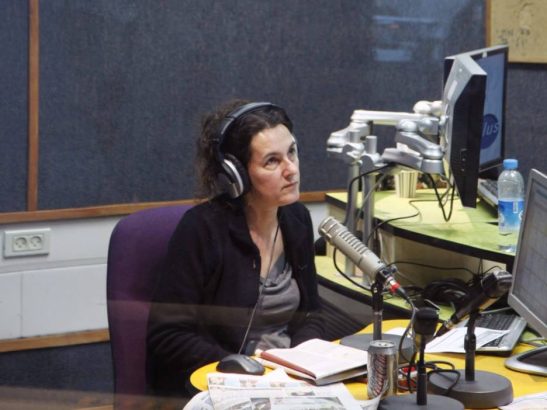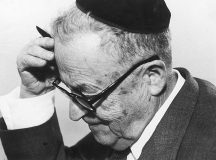In 2002 the Israeli novelist Irit Linur wrote an open letter to the editor of Haaretz announcing that she had cancelled her subscription to the newspaper.
It is a person’s right to be a radical leftist, and publish a newspaper in accordance with their world view … However, Haaretz reached a level of radical leftism in which its anti-Zionism is often turned into malevolent and stupid journalism … When Gideon Levy [Haaretz columnist and correspondent for Arab affairs] accuses Israel of turning Marwan Barghouti from a peace seeker to an organiser of suicide bombings, his accusations are as rational as post-9/11 conspiracy-theories that the destruction of the Twin Towers in New York was the work of the Mossad. In a private conversation he once told me he wouldn’t drive 100 meters to save the life of a settler. It seems to me that his loves and hates have long been polluting the heart-wrenching reports he files from the occupied territories. His entire career is infected by hucksterism; He’s one of very few reporters in the world who reports on Arab matters without speaking a word of Arabic. He gets simultaneous translation and that’s enough. This is amateurish journalism.
Gideon Levy and Amira Haas hold the Palestinian portfolio in Haaretz. Like them, I acknowledge the journalistic and human value of these reports but … as far as they are concerned; Israel will always carry the blame for Palestinian suffering as well as for Palestinian murderousness. This is a blinkered and shallow interpretation, ethically and professionally flawed. Both avoid reporting the atrocities that Palestinians commit against each other. And there are Palestinians they never get to encounter: anti-Semites, chauvinists, corrupt, cheering when terrorist attacks are perpetrated on Israel. When a pro-Palestinian bias is the most conspicuously consistent feature in their reports I find it hard to maintain my faith in their articles. And since I am, excuse me, a Zionist, I don’t feel like getting every morning a dose of news that is the equivalent of The Voice of Thunder from Cairo [an all-day radio broadcast in broken Hebrew whose propaganda during the days before the Six-day War was cranked up to crisis-hysteria levels seeking to terrify the Israeli populace]. […]
I have come to the conclusion that you and I do not inhabit the same country. More and more of your articles smell like foreign journalism that treats Israel as if it were a remote and repugnant territory. I get the feeling that the state of Israel disgusts you in some elementary way. But the thing is, it doesn’t disgust me. I don’t wish to subscribe to a paper that tries in every conceivable way to make me feel ashamed of my Zionism, patriotism and intelligence, three qualities I deeply cherish. (Emphasis added.)
In order to explain what I find admirable about Linur, I need to provide a bit of context. Linur was born in 1961, more or less halfway between two wars: the 1956 Sinai Campaign and the 1967 Six-Day-War. She grew up in Tel Aviv, where she still lives. She started her writing career as a satirical columnist in local newspapers, before co-hosting The Final Word at Galei Zahal’s (Israel’s Military Radio). The programme teamed up two commentators to discuss current events, one from the Left and the other from the Right. Linur represented the liberal Left.
In 1994 she achieved national fame with her novel The Siren’s Song which was later adapted into a film directed by Eytan Fox. Since then there have been more novels – Two Snow Whites was a mystery about a photographer who gets herself involved in a murder case, Sandler Ella, a behind the scenes look at the dysfunctional lives of glitzy media personalities, and The Brown Girls, adapted as a popular television mini-series – as well as a book of humorous essays, The Secret Blonde, translations of Charles Dickens’s Nicolas Nickelby and Jane Austen’s Pride and Prejudice. (the latter she adapted Austen’s novel to a television mini-series, transplanting the narrative to an Israeli setting, titled What a Bachelor Needs). Her recent novel, Mrs. Warburg features an unsurnamed female narrator who, in chronicling her life from childhood to adulthood tries to de-code the key to her soul.
Linur insists on the normality of Israel in the face of a world that insists on its abnormality. In November 2008 the writer Eamonn McDonagh expressed his puzzlement at an article in El Mundo in which the writer ‘works himself into something of a lather about the 21 days in prison recently dished out by the Israeli Air Force to one of its members who had allowed himself the luxury of an unsmothered yawn during a speech being delivered by the commanding officer of the Ramat David air force base, on the occasion of a ceremony to mark the anniversary of the assassination of Yitzhak Rabin.’ ‘I can’t help thinking,’ wrote McDonagh in response, ‘that texts like this get written because a certain class of person can’t accustom themselves to Jews possessing certain kinds of institutions and exhibiting certain kinds of behavior – institutions like armed forces and behavior like the imposition of military discipline – that are regarded as unremarkable when possessed and exhibited by other peoples.’ (emphasis added)
Similarly, when the BBC Jerusalem-based correspondent Tim Franks interviewed Israeli journalist Tal Schneider about why early elections had come about in Israel, he was unable to accept here explanation. Schneider said, ‘There is… bad sentiment coming out from the crowds, specifically on economic issues. The cost of living here is very expensive and there is a huge housing crisis going on for years … and we don’t see end of sight.’ Franks objected: ‘You make Israel sound like a normal country when you’re talking about economic problems, about value added tax, housing and so forth… of course the reason the outside world is so interested in Israel is because of the wider issues with the conflict, with the Palestinians and so forth.’
This response tells us much about the pervasive narrative in the media about Israel. The country is seen as racist and violent, judged through only one narrow prism: their relationship vis a vis the Palestinians. Aspects of life which Israelis share with other citizens in the free world are blacked out of the picture.
And this refusal to normalise Israel is deliberate and theorised. The radical feminist philosopher Judith Butler argues that to admit normalcy is to deny core abnormality, understood as a secular and enlightened version of original sin.
It was because Linur felt Haaretz treated Israel in this way each day that she publicly cancelled her Haaretz subscription.
The Novelist
Incontestably, the triumvirate of the greatest Modern Hebrew authors are Amos Oz, A.B. Yehoshua, and David Grossman. Their novels and writings are read in America, Europe and beyond, perhaps because a certain Israeli existential angst is an organic to their oeuvre. As Tolstoy and Dostoevsky explored the darkest and deepest recesses of what it means to be Russian, so these authors of the Hebrew Canon bore into the battered identity of the Israeli psyche. When I read these great novelists I always get the feeling that the narrative cloaks a political undertow, a looming catastrophe that lurks underneath. These stories are the dreams through which we, the reader-psychologist, descend to the secret basement where the shadowy truths and nightmares are found.
The eminent Israeli literary critic Dan Miron once wrote that everything in Hebrew literature ‘has a political stamp on it.’ His point was subtle: ‘Israeli writers formulate their individual experiences and yet every important Israeli novel which deals with the destinies of private individuals conveys something of the situation of the collective. […] Naturally political poetry also exists but the main flow of literature deals with questions of private life and yet something over and above this emerges… ‘
Perhaps this is why, when I stumbled upon Irit Linur’s first novel ‘Shirat Ha-Sirena’ (The Siren’s Song), it felt like I’d been touched by the Greek God Zephyr, that bringer of the fresh wind and the spring rains. In the irreverent voice of its mischievous thirty-something female lead, here was a novel – finally! – about the daily lives of Israelis as they pursue their own all too human projects.
Irit Linur’s novels have not been translated into English. Perhaps that is because her Israeli characters are thought not to be interesting to a readership weaned on the Yehoshua-Oz-Grossman school of national soul searching. Linur writes what literary critics refer to as Chicklit, considered blithe and focused on the mostly humorously experiences and struggles of modern womanhood. The heroine’s relationship is not restricted to the pursuit of a mate but encompasses her entire cultural web of family and friends. By the end of the novel she has learned some valuable insights into her own self, and those around her. The genre is largely dismissed by critics as reflecting a fixation on consumerism and sexuality rather than addressing global issues such as equality and justice.
Linur has been compared in the past to the British author Helen Fielding, best known as the creator of the fictional character Bridget Jones. It is a felicitous analogy but I would add the American Nora Ephron to the company. And it is not coincidental that these three authors draw deep inspiration from Jane Austen’s oeuvre. Ephron’s Joe Fox in You’ve got Mail, Fielding’s Mark Darcy in Bridget Jones’s Diary and Linur’s Noah Ne’eman in The Siren’s Song are all variations on the original Austen Desirable Man, Mr. Darcy.
The Siren’s Song is the story of the beautiful, tall and witty Talila, a thirty-something advertising professional living under Saddam Hussein’s Scuds during the first Gulf War. She lives in Tel-Aviv and leads a hedonistic existence filed with shopping, parties, and sexual flings. Her meeting with a hapless, rumpled Food engineer, who never ties his shoelaces, occurs as Israel is getting ready for the Scuds. Their turbulent love is tested and affirmed against the backdrop of the ululating air-raid sirens which sounded almost every night during the six weeks of the Gulf War. Talila’s learns to discern fundamental sweetness and decency in people she formerly feared, resented, or suspected, and something of the cavernous human ability to forgive and to love. One of those figures she learns to appreciate anew is her former, sartorially-impeccable elitist boyfriend, Offer (played in the movie of the novel by the Israeli politician Yair Lapid). The book simultaneously celebrates Tel Aviv for its hub of creative energies and reproaches the city for its superficial lifestyle.
The Reader
According to Ynet’s literary critic, Goel Pinto, Linur’s reputation as a mordant leftist feminist is compromised by her literary love affair with Jane Austen. He calls Pride and Prejudice frothy fiction, an old-fashioned straight (as in non-gay) romance between a man and a woman and Linur’s translation of the novel is offered as proof of her true petite bourgeoisie mentality. Later, Pinto describes Elizabeth Bennet as a tedious sourpuss. Responding to this astonishingly ill-informed attack, Linur pointed out that Elizabeth’s singularity can be observed in her refusal to be defined by Darcy’s denigrating objectification of her as insufficiently beautiful for him to dance with. Elizabeth, explains Linur, doesn’t lose her sense of humour, doesn’t cringe, and doesn’t allow Darcy to erode her self-esteem. Instead, she laughs at him. Much to her credit, Linur, similarly, did not lose her composure when the most sparkling fictional female in the Western Canon was attacked by Pinto, thus establishing herself as a true daughter to Elizabeth: ‘If A.B. Yehoshua or Amos Oz were sitting here, you would have conducted a totally different interview’, she tells him, ‘but I accept that some people like me and some people hate me.’ Please note how she is being much more charitable to him than he is to her. She doesn’t imply his denigration of her intellectual pursuits is due to anything other than his taste in literature.
The Translator
Linur translated Pride and Prejudice twice. First, into Hebrew, second into a 6-part TV mini-series set in Israel.
For the former, Linur abandoned her buccaneering spirit, perhaps in awe of Austen’s language. ‘If I were bolder I would re-translate the novel, reconstruct the sentences. But throughout the project I kept asking myself what right I had to take apart Austen’s formulations for the sake of Hebrew coherence.’ ‘English’ she pointed out, ‘is much more pliable. Hebrew is less tolerant. It is a very succinct language.’
No two translators will ever agree about the quality of a translation. As one myself, I found Linur’s Austen too haughty, the Hebrew text so rigidly following the syntactic structure of the English sentences that the result is awkward, lacking Austen’s elegance, ease, grace and flow.
For the latter translation, adapting the novel to a TV mini-series, Linur’s determination to suppress her own authorial creativity in the novel translation gave way to a burst of mad creativity, indulging her own expressive talents, completely adapting the novel to Israeli realities while still ‘doing’ Austen. Elizabeth becomes Allona, a 36 year old divorcee with a feisty but lovable teenage daughter, Zohar. Allona is a project engineer in a pharmaceutical company located in the Galilee. Nimrod Artzi, 28 year old, formerly known as Darcy, is the owner of the company, as well as a few others. They meet by chance when Artzi takes his best friend Bengal (Bingly), Bengal’s sister, and his own sister Noga, a 19 year old soldier (Georgianna), for a weekend of peace and quiet among the green mountains of the Galilee. Allona’s parents own a vegan-type bed & breakfast outfit right next to the luxurious hotel in which Artzi’s company of friends are staying. So Artzi and Allona meet under the most unromantic circumstances, as they both stop by the roadside when nature calls.
From that point on, the narrative unfolds like a released tight coil. There is not much prejudice in this adaptation, unless you consider the age gap between Allona and Artzi as meriting the raising of a sceptical eyebrow. But there is an abundance of pride, ill-temper and suspicion, which gradually erode as the characters get to know each other. For me, it was Allona’s 15-year old daughter who was the sparkle and light of the series. She gets Mr. Bennet’s wit, misogyny and recklessness but, unlike him, is teachable. One of the most brilliant creative inversions in the series is the scene where Artzi goes to get Zohar’s consent to court her mother properly. They negotiate and he convinces her that it will be in her interest to stop putting up a resistance to coupledom.
It is a delightful, localized interpretation of Austen’s masterpiece, taking neither itself nor the source too seriously. This approach opens up the space for improvisations and modifications of the original plot so that it fits the laissez-faire atmosphere of secular Israeli society.
The buxom and enormously talented Hannah Laszlo plays Mrs. Bennet, and is very credible as the hectoring Israeli mother and wife. As she says at one point: What have I ever asked of our daughters? That they meet a nice, steady young man, with a good job, check out his family to make sure there is no crazy uncle tucked away somewhere, get married, make babies and come every other Friday for dinner at grandma’s house.
A bonus
For a taste of Linur’s in-your-face feminist plain-speaking here is a very short excerpt from one of the articles she included in her non-fiction compilation The Secret Blonde.
The world is divided into two groups: Men who do not call and the women who sit by the phone waiting for the men to call.
One of my own close friends is a woman who holds the world’s record in waiting for a man to call. She is happily married with a child now. Ten years ago she had a brief fling with a guy named Shai. In the morning after a stormy night he drained his cup of coffee and told her he would call when his phone has been re-connected. Last week my friend and I met to discuss matters of high and low world events when out of the blue she says: Can you believe this schmucky phone company? Ten years and still they haven’t re-connected Shai’s telephone…
It’s a normal life in Israel, all too normal.





































Delightful introduction to Linur and her work. Someone who repudiates Ha’aretz, loves Austen and has a clever sense of humor clearly deserves further attention.
I would love to read her in English. So, when will you begin translating her novels?
It is true. The Arab Spring turned into Arab Storm, the radical Islamists are terrorising the world but the radical leftist journalists and modern authors don’t see it. It seems that most of them are living in another planet.
What a delightful essay. It makes me sorry that I neither speak nor read Hebrew; I would love to see Linur’s TV Mini-series of Pride and Prejudice and I would like to read her novels. Maybe Noga Emmanuel will translate them?
When I looked at the article a second time, I realized the lovely lightness of the last pages put me in a bit of a trance, and allowed me too easily to escape from thinking about the more profound points on the earlier pages. I wish that Emmanuel had had sufficient space to develop her point about Judith Butler’s ideas on normalcy/abnormalcy and thus to draw out that connection a bit more. Is Israel thrust into the role of abnormal by its greatest novelists and some of its journalists in a way that forces it to play the role of the abject? Or is the problem that this singular focus on political crisis refuses normalcy and the exploration of the everyday for the country and its thinkers? I wasn’t quite sure how Emmanuel wanted to use Butler here, but it looks like the article has been overly edited.
I loved Emmanuel’s first paragraph under the heading “the novelist.” Those last two sentences, “When I read these great novelists …” are lovely both stylistically and in content. Perhaps they provide the answer to my question above: only the subterranean is explored in these great novelists; Linur triumphs on the first floor.